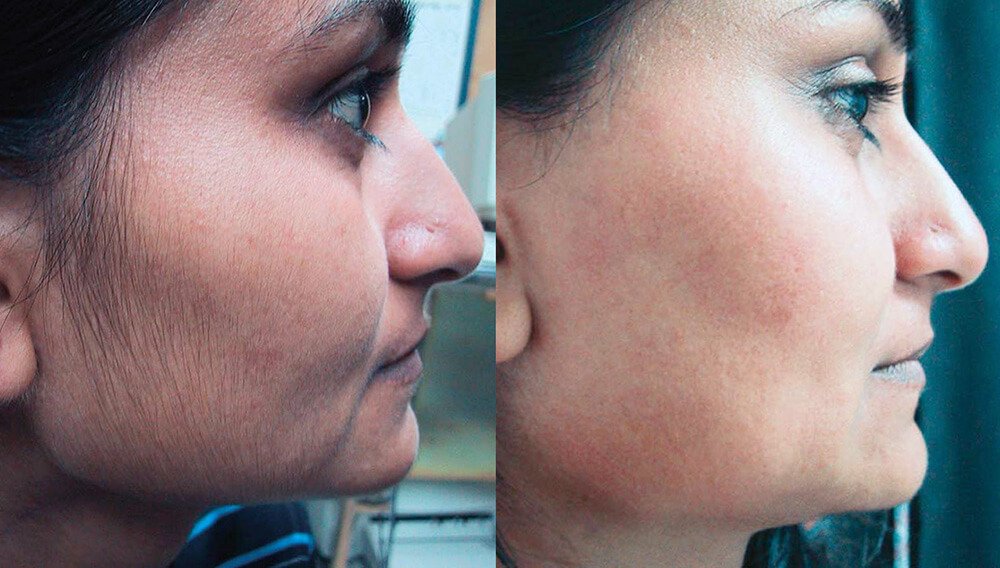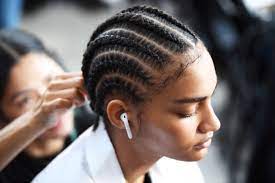
Hirsutism (excess facial hair growth) is one of the many symptoms associated with Polycystic Ovary Syndrome (PCOS) and is caused by elevated levels of male hormones known as androgens. Studies show that unwanted hirsutism has an overwhelmingly negative impact on PCOS patients’ quality of life and leads to psychological disturbances, financial burdens, and worry. This research examined its psychosocial and economic consequences among those experiencing unwanted hirsutism.
Weight Loss
Polycystic Ovarian Syndrome (PCOS) can trigger insulin resistance that leads to the overproduction of androgens (male hormones), which in turn increase dihydrotestosterone (DHT) production, causing unwanted facial hair. A weight loss diet and DHT blockers may help mitigate this problem by inhibiting DHT production and balancing hormone levels, providing relief. These techniques take time to become effective but are an ideal long-term solution for improving insulin sensitivity and decreasing hirsutism. Furthermore, they address the root causes – insulin resistance and hormonal imbalances – and are safe without unwanted side effects.
Birth Control Pills
Many women with PCOS must manage unwanted facial hair growth as an unwanted side effect of polycystic ovary syndrome. While this is normal, it can still cause distress and decrease self-esteem. Luckily, there are various solutions to manage this problem. PCOS facial hair treatment typically relies on hormonal birth control pills containing estrogen and progestin, helping regulate any hormonal imbalance that could contribute to hirsutism in patients with PCOS. Doctors may prescribe DHT blockers, which inhibit DHT production and decrease androgen levels, as a treatment for male pattern baldness or PCOS women displaying signs of hirsutism.
Anti-Androgenic Medications
PCOS causes hormonal imbalances that lead to excessive facial hair growth, known as hirsutism. Although challenging to eradicate, treatment methods include weight loss, birth control pills, and anti-androgenic medications. Anti-androgens are medications designed to block androgen hormones from binding with their receptors, often prescribed in tandem with oral contraceptives. Some examples include Flutamide, Spironolactone (Aldactone), and Cyproterone Acetate as anti-androgens. While many individuals tend to focus on treating acne and irregular menstrual cycles, other less severe PCOS symptoms, like excess facial hair growth, can also be treated successfully. It is important to remember that such treatments will only provide temporary solutions.
Topical Medication
Polycystic Ovary Syndrome (PCOS) can lead to unwanted hair growth. The condition is caused by an imbalance of hormones, particularly an excess of androgens, leading to problems with ovulation and menstruation cycles, as well as other symptoms like hirsutism. Hirsutism refers to an increase in facial and body hair growth that occurs in androgen-sensitive areas, usually within PCOS women, which may account for up to 80% of its cases. Before applying topical medications, first be sure to clean and dry the area to which they will be applied. Also, ensure that the concentration is appropriate for where it will be applied.
Electrolysis
Women experiencing excess hair growth on their faces, bodies, and breasts should seek medical advice if they suspect Polycystic Ovary Syndrome (PCOS). This hormonal condition causes an imbalance, which in turn increases testosterone production, resulting in hirsutism, as well as other symptoms like acne and irregular periods. Electrolysis can permanently remove unwanted hair by damaging each hair follicle with heat or chemical energy, effectively disabling their growth centers and eliminating them altogether. A person will typically require several sessions in order to permanently clear away hair in one area; be sure to select an electrologist who adheres to strict hygiene regulations – ask friends or family members for recommendations, and arrange a free consultation session!
Laser Treatment
PCOS can cause many debilitating symptoms, from infertility and cystic acne to unwanted facial hair growth. This hair growth results from an imbalance of hormones, which causes your body to produce too much androgens. Treatments for PCOS-induced hirsutism include weight loss, birth control pills, anti-androgenic medications, electrolysis, or laser treatments. Before the procedure begins, your physician will numb your skin with medication or may sedate you for intensive resurfacing. Unprotected sun exposure should be limited during the recovery period, and any supplements or medications that interfere with it should also be stopped temporarily.

